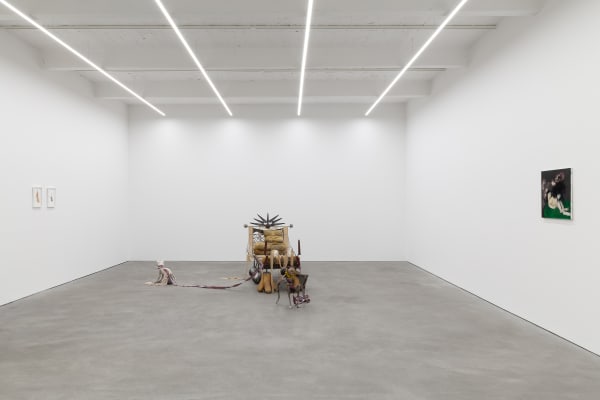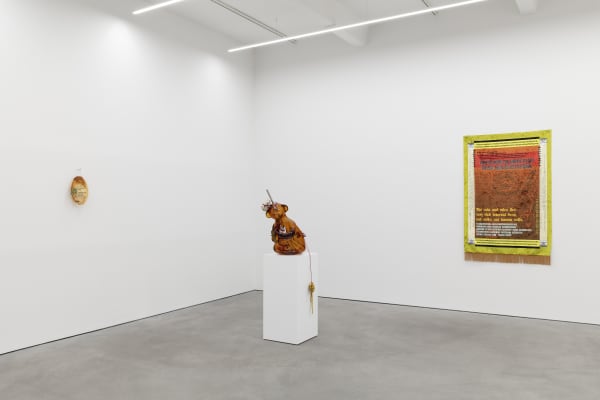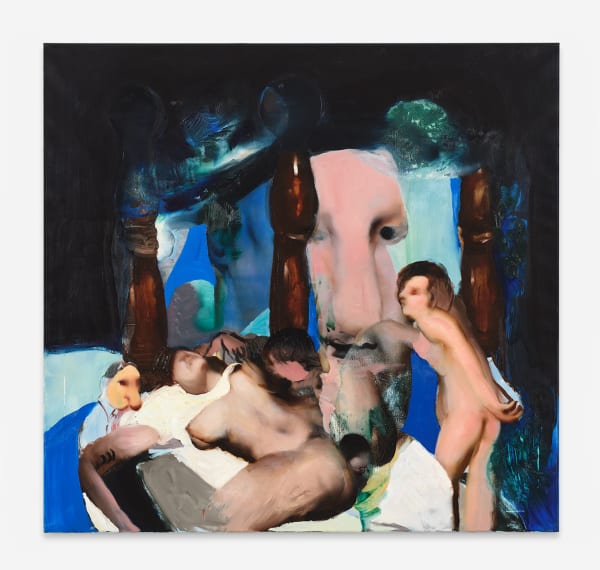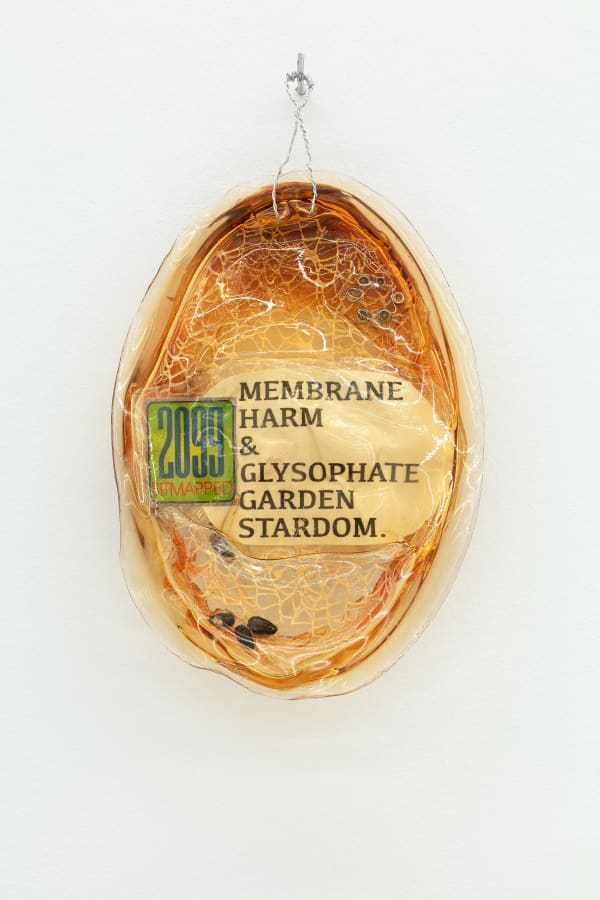Blue of Noon: Nils Alix-Tabeling, Sharona Franklin, Amy Lien & Enzo Camacho, Sydney Shen, Ambera Wellmann, Alison Yip
-

Blue of Noon, Installation view, Kraupa-Tuskany Zeidler, Berlin, 2022
-

Blue of Noon, Installation view, Kraupa-Tuskany Zeidler, Berlin, 2022
-

Blue of Noon, Installation view, Kraupa-Tuskany Zeidler, Berlin, 2022
-

Blue of Noon, Installation view, Kraupa-Tuskany Zeidler, Berlin, 2022
-

Blue of Noon, Installation view, Kraupa-Tuskany Zeidler, Berlin, 2022
-

Blue of Noon, Installation view, Kraupa-Tuskany Zeidler, Berlin, 2022
-
 Héligabale daybed
Héligabale daybed -
 Gargouille
Gargouille -
 Sermand
Sermand -
 2022
2022 -
 Tarantula
Tarantula -
 Orfeo
Orfeo -
 Preliminary sketch for 'Fire Monkey Fries Expectations' (Art Basel) BEGGAR
Preliminary sketch for 'Fire Monkey Fries Expectations' (Art Basel) BEGGAR -
 Preliminary sketch for 'Fire Monkey Fries Expectations' (Art Basel) GUAN YIN
Preliminary sketch for 'Fire Monkey Fries Expectations' (Art Basel) GUAN YIN -
 Měi Hóuwáng (Handsome Monkey-King), Neuro-Endocrine (Christopher Marte)
Měi Hóuwáng (Handsome Monkey-King), Neuro-Endocrine (Christopher Marte) -
 Juiced!
Juiced! -
 Untitled (goblin organizer)
Untitled (goblin organizer) -
 Herbicidal
Herbicidal -
 RX Vortex
RX Vortex
The 1935 novel Blue of Noon by Georges Bataille posits the duality of revolutionary acts within shifting paradigms, namely those of active dissent and nihilism. Set in the backdrop of an impending war, the characters within the story navigate a seemingly endless amount of chaos, corruption, and death. The works within the exhibition Blue of Noon approach modes of resistance in response to the violence of normativity, colonization, upheaval, and erasure of personal histories. By hosting this assemblage, the exhibition environment transforms into a frantic and macabre vision, at times anthropomorphizing these drives into otherworldly, even monstrous figurations.
In Bataille’s Blue of Noon, the bed is a recurring site where various facets of human activity transpire. Following the narrative, one immediately becomes privy to the delirious and base sexual life of the protagonist Henri Troppmann. Shabby hotel room mattresses serve as platforms for debauchery and escape from reality. The bed also envelops his physical and mental state of being, imprisoning him in his own nightmare. At times too feverish and weak to move, Troppmann is overpowered by the weight of his condition. In Ambera Wellmann’s work Tarantula (2022), a pall of black shadow hangs over a reclining figure like a ghoulish creature. Across the room in Wellmann’s 2022 (2022), amid the intermingled figures, multiple sets of bleary, deadpan eyes peer from behind the bedposts, perhaps embodying a sense of existential paranoia.
Like an altar, Nils Alix-Tabeling’s Héligabale daybed (2021) is dressed with fragrant herbs, pointed crystals, and delicate drapery. With hands reaching out, the daybed takes a human form, suggesting a subtle embodiment of Elagabalus, a controversial Roman emperor from 200 AD. Elagabalus was known for his decadent and transgressive acts during his reign and was eventually assassinated at the age of 18 by his family for his refusal to conform to his assigned gender and his role as an emperor. Two capricious, catlike creatures hover near the feet of the bed. Tethered to it by silk and cord, Sermand and Gargouille are bound, but their expressions are defiant and unruly.
Sharona Franklin’s work RX Vortex (2019) makes visible the violent division between the resource and power-laden pharmaceutical industrial complex, and those who are controlled by it. This dynamic surfaces in narratives such as the reduction of humans to test subjects and the objectification of living entities. The imbalance of agency is apparent–as much as we yearn to escape the commodification of our corporeality, our mortality inextricably ties us to this same system that exploits and violates us. Perhaps embodying this struggle, Herbicidal (2022) has started to decompose through its drying process as it solidifies. Trapped inside a jelly membrane similar to fossilized amber, elements of the artist’s daily life are preserved, along with a distinct reference to the pesticidal substance glyphosate, which poisons every living being it comes into contact with.
Rigidly tailored narratives of vitality permeate beyond the pharma industry into every facet of life. Alison Yip's works contest seemingly intractable prospects of our lives by baring their inconsistencies. In Yip’s Juiced! (2022), a gelatinous substance covers the conspicuously green smoothie, as the contents whirl and blitz in verdant abstraction, a picture of health. This part of Juiced! is intended to break down over time, defying the expectation of longevity of painting. In Yip’s Untitled (goblin organizer) (2022), various body parts are anatomized into neat shelves like a newfangled exquisite corpse, composed of contemporary ideals of productivity and aspiration gone awry.
Embodying the year of the Fire Monkey, which was predicted by astrologists to be characteristic of havoc, blood, impulsiveness, and inflammation, Amy Lien & Enzo Camacho’s Monkey King (2018) sculpture bears its organs outside, against its hollow, resinous body. Red strings thread through the center, as though linking strange clues, connecting a schema synthesized based on variously sourced organizing principles: from the rebellious monkey king’s journey to enlightenment (according to popular Chinese mythology) to the conventional systems of Western medicine; from the left-right axis of political ideologies to the speculative numerology of art fairs. Two preliminary sketches for the monkey king abstract its form even further as its organs float outward and hang from plant-like stems.
Sydney Shen’s Orfeo borrows the form of a ‘shame fiddle’, a historical instrument used to punish those convicted of petty crimes. Shen inlaid a toy labyrinth in this disciplinary device that, if worn, would be animated by the struggle of the bearer to break free, while the polished balls of carved dinosaur excrement trundled around in an endless maze. The absurdity of this device that traps and humiliates, coupled with an imposed incapacitation makes visible the physical and social consequences inflicted by the state. Perhaps this thwarted existential frustration is echoed in its title, Orfeo, a figure of tragedy that descends into the underworld only to return fruitlessly.
Blue of Noon is curated by Christina Gigliotti and Catherine Wang




















